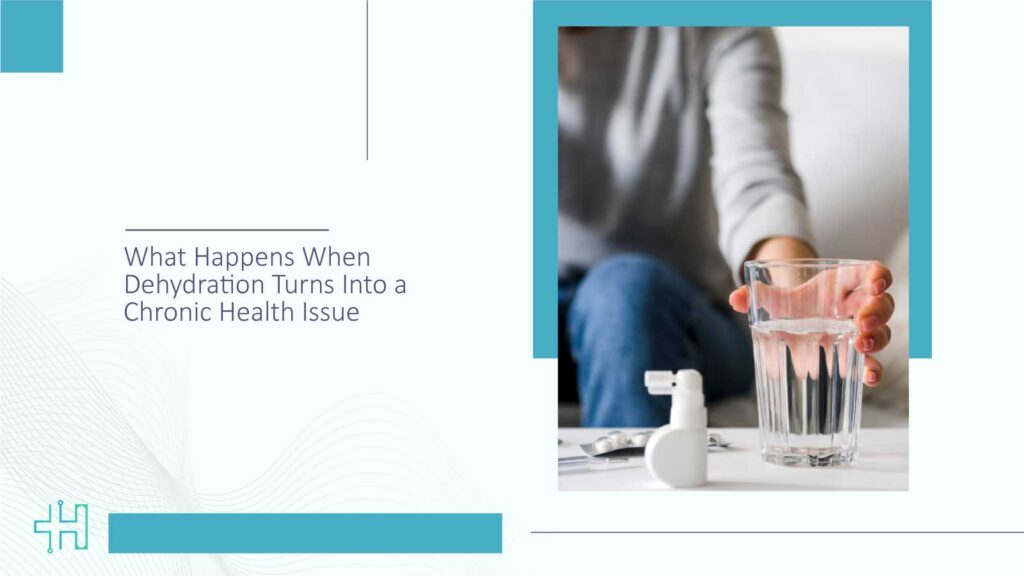Most of us think of dehydration as something that happens when we forget to drink water on a hot day. You feel thirsty, grab a glass of water, and move on. But dehydration is not always that simple. For many people, dehydration becomes something the body quietly adapts to. You may not feel thirsty, yet your cells are still running low on water. When this state continues for weeks or months, it can begin to affect digestion, sleep, mood, concentration, and even long-term organ health.
In fact, research has found that close to 75 percent of adults may be living with mild, ongoing dehydration without realizing it.
This means chronic dehydration is not rare. It is common, overlooked, and can show up in subtle ways that people often mistake for stress, fatigue, or aging. The body depends on water for nearly every internal process. So when hydration levels remain low for too long, the body begins to conserve water. This conservation mode may feel normal at first, but it slowly impacts how your body functions and how you feel every day. Let us explore what actually happens inside your body when dehydration becomes long-term, what signs to watch for, and how to restore hydration sustainably.
How Your Body Responds When Dehydration Becomes Long-Term?
Your body is incredibly adaptable. So when it senses less water, it adjusts.
1. The Body Tries to Save Water
The kidneys filter less water to maintain blood volume. This leads to darker, more concentrated urine. Over time, this puts extra pressure on the kidneys because they have to work harder to filter wastes with less fluid.
2. Your Digestive System Slows Down
Water helps move food through the digestive tract. Chronic dehydration can slow bowel movements, leading to bloating, heaviness after meals, and constipation. People often blame the wrong foods when the real issue is hydration.
3. Your Brain and Mood Shift
The brain is almost 75 percent water. Even mild dehydration affects how you think, focus, and handle stress. Studies show that dehydration can cause decreased attention, fatigue, and reduced short-term memory. When dehydration is ongoing, these symptoms can start to feel like your new normal.
4. The Skin Becomes Dull and Less Elastic
Skin is one of the first areas affected by low hydration. Without enough water, it loses elasticity and glow. Many people try skincare products for dryness when hydration is what their cells actually need.
5. Muscles Get Stiff and Sore Faster
Muscles require water for contraction and recovery. Chronic low hydration increases soreness, tension in the neck and shoulders, and exercise fatigue.
Why People Develop Chronic Dehydration Without Knowing?
Chronic dehydration is often not about forgetting to drink water. It is usually about habits, environment, and lifestyle.
You may be dehydrated if:
- You drink coffee or tea more than water.
- You exercise or walk outdoors, but never replace fluids.
- You live in a dry climate or work in air conditioning all day.
- You eat a low-fruit, low-vegetable diet.
- You drink water only when you feel thirsty.
Thirst is a late signal. When you feel thirsty, your body is already behind.
Subtle Signs Your Body May Be Chronically Dehydrated
Some signs are obvious, like dry mouth or dark urine. But the more concerning signs are subtle and long-term.
- Low Energy or Midday Fatigue – Water helps cells produce energy. When hydration is low, you feel tired even after sleeping well.
- Brain Fog – Difficulty focusing can sometimes be your brain requesting hydration.
- Persistent Headaches – Even mild dehydration changes blood flow in the brain and can trigger headaches.
- Feeling Lightheaded When Standing – This is related to fluid volume affecting blood pressure.
- Muscle Cramps or Stiffness – The body loses electrolytes along with water, affecting muscle function.
- Dry lips or flaky skin that does not improve with moisturizers – This is often hydration-related from the inside out.
- Frequent Constipation – The colon pulls water from stool when the body is running low, making bowel movements harder.
How Chronic Dehydration Impacts Long-Term Health?
If dehydration continues over months or years, deeper systems can be affected.
- Kidney Health Declines Slowly – The kidneys filter toxins using water. Low hydration can lead to kidney stones and increase strain on kidney function.
- Joint Lubrication Decreases – Water cushions joints. Without it, joint pain and stiffness become more noticeable.
- The heart has to Work Harder – Blood becomes thicker with less water, which means the heart has to pump harder to circulate it.
- Skin Aging Speeds Up – Hydration is essential for collagen health. Long-term dehydration can contribute to fine lines and loss of skin elasticity faster than expected.
- Stress Response Becomes More Reactive – When hydration is low, the stress hormone cortisol increases. This can make everyday stress feel heavier.
None of these changes happens overnight. They build slowly, so the underlying issue often goes unnoticed.
How to Rehydrate Safely and Sustainably?
The goal is not to suddenly drink large amounts of water. That can overwhelm the kidneys and simply flush out electrolytes. The goal is to support hydration slowly and steadily.
1. Start Your Morning With Water Before Coffee – Your body loses hydration during sleep. Refill it before caffeine, which is mildly dehydrating for some people.
2. Add Electrolytes, Not Just Water – Electrolytes help your body actually absorb water into cells. Add a pinch of sea salt and a squeeze of lemon to your water or choose a clean electrolyte mix.
3. Eat Water-Rich Foods – These help hydration stay inside your body longer. Water-rich foods include:
- Cucumbers
- Watermelon
- Citrus fruits
- Berries
- Leafy greens
4. Sip Through the Day Instead of Chugging – Steady hydration is easier on your kidneys and more effective.
5. Pay Attention to Urine Color – Pale straw yellow is the general indicator of adequate hydration.
When to Seek Medical Guidance?
If you notice:
- Persistent dizziness
- Very dark or strong-smelling urine
- Extreme fatigue
- Rapid heartbeat
- Swelling in the ankles or feet
It is important to speak with a healthcare provider. Long-term dehydration can sometimes signal underlying conditions that need professional evaluation.
FAQs
1. Can you be dehydrated even if you do not feel thirsty?
Yes. Thirst is a delayed response. Many people with chronic dehydration do not feel thirsty at all.
2. How much water should most adults drink per day?
A general guideline is 2 to 3 liters a day, but needs vary based on climate, diet, and activity. Your urine color often gives the best indication.
3. Does coffee or tea cause dehydration?
Caffeine can increase fluid loss slightly, but moderate coffee or tea does not typically dehydrate if you drink enough water overall.
4. Can chronic dehydration cause anxiety or mood changes?
Yes. The brain needs water to regulate neurotransmitters and stress hormones. Low hydration can increase irritability and tension.
5. How quickly can the body recover from chronic dehydration?
Cells begin rehydrating within 24 to 48 hours of consistent hydration habits. Full recovery may take weeks, depending on severity.
Dive deeper into the future of healthcare.
Keep reading on Health Technology Insights.
To participate in our interviews, please write to our HealthTech Media Room at sudipto@intentamplify.com





